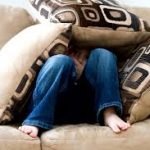Frightening Things Sleep Loss Can Do to Your Body
Original Post by: Sara Middleton, staff writer | December 18, 2019


The sleep loss some people willingly subject themselves to is doing the exact opposite of helping them gain an academic “edge,” and is in no way beneficial for stress management (NaturalHealth365) Calling all students, board executives, parents with busy families, or any other hard-working individuals: pulling all-nighters is officially no longer something to brag about!
Case in point? Research from institutions like Texas A&M College of Medicine and St. Lawrence University finds that consistently pulling all-nighters is associated with a lower grade point average – in addition to increased anxiety, impaired performance, and a myriad of other problems.
Pulling all-nighters will lower your grade point average and increase the risk of weight gain
Poor grades and a low-grade point average (GPA) can be big issues, but they’re certainly not the only ones caused by staying up all night. According to research, pulling all-nighters or consistently getting less than 6 hours of sleep per night increases the risk of other serious and undesirable health consequences, including:
- Weight gain
- Cancer
- Heart disease
- Accidents
- Depression and anxiety (even just one sleepless night can raise anxiety levels by as much as 30%, according to a recent study from the University of California Berkeley published in Nature Human Behavior)
Of course, we’d be remiss to just harp on the negatives. For example, the same UC Berkeley study we just mentioned also determined that deep non-rapid eye movement sleep (the non-dreaming stage) can literally rewire brain circuitry in such a way as to decrease anxiety, as well as lower blood pressure and heart rate.
We also know that consistently getting a sufficient amount of sleep (that’s 7 to 9 hours per night for adults) increases our mood and productivity, reduce our risk for diabetes, helps us manage stress, and strengthens our immune system to help us avoid getting sick.
Psst: teens need about 8 to 10 hours of sleep, and kids between the ages of 6 and 12 need about 9 to 12!
Do NOT ignore the health dangers linked to toxic indoor air. These chemicals – the ‘off-gassing’ of paints, mattresses, carpets and other home/office building materials – increase your risk of headaches, dementia, heart disease and cancer.
Get the BEST indoor air purification system – at the LOWEST price, exclusively for NaturalHealth365 readers. I, personally use this system in my home AND office. Click HERE to order now – before the sale ends.
Struggling with sleep apnea or insomnia? Here are three natural tips for combating sleep deprivation
If you have a hard time falling and/or staying asleep, you’re in good (albeit tired) company. According to the Sleep Health Foundation, 1 out of 3 people have at least mild insomnia.
But popping a sleeping pill – whether over-the-counter or prescription – doesn’t work long-term…and, of course, poses the risk of dependency and adverse side effects.
So, how can you ease your mind and get to sleep better without becoming reliant on drugs? Previously, we’ve shared some helpful tips for improving your sleep naturally in our NaturalHealth365 podcast. But, for a brief refresher, here are three simple strategies you can start implementing tonight:
- Turn down the temp. Sleep research indicates that an ideal bedroom temperature is between 60 and 68 degrees Fahrenheit (ca. 20 °C). Surprisingly cool, but it seems to be ideal for helping your body create melatonin, a major sleep-wake cycle hormone. Plus, we all know how hard it is to fall asleep on a hot summer’s night when the A/C breaks!
- Power down your devices. Dim your lights and avoid using televisions, cell phones, tablets, and laptops about an hour before bed. Hard to do? Sure. But if the trade-off is better sleep and better health, it definitely seems like a challenge worth taking on.
- Implement a relaxing bedtime routine. Instead of scrolling on social media, try kicking back with a book or journal, deep breathing in a hot shower, or testing out that new DIY facial mask you’ve been wanting to try. Practice regular self-soothing acts that help your body wind down.
Sources for this article include:
Livescience.com
Sleephealthfoundation.org
Sleepadvisor.org
Sciencedaily.com
Sciencedaily.com
Berkeley.edu
ADAA.org
Washingtonpost.com
Healthfinder.gov
